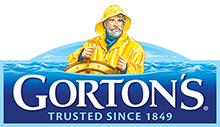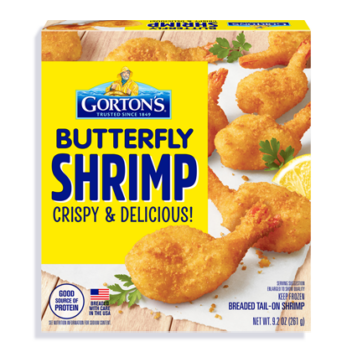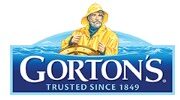Gorton’s and The New England Aquarium work in tandem to transform the fishery industry, positively impacting the health of the ocean and consumers.
Gorton’s Seafood and the New England Aquarium today celebrated a 10-year partnership of bringing sustainable seafood to consumers. Due to its close partnership with the Aquarium’s Anderson Cabot Center for Ocean Life, Gorton’s can proudly claim 100% of its principal products are certified sustainable or in full assessment for certification.
A focus of the partnership has been on increasing the number of fisheries and farms that are environmentally certified by a third party. Environmental certification provides assurance that these fish are caught or farmed in ways that protect the long-term supply of seafood and minimize impact on ecosystems.
Team members from Gorton’s Seafood and the New England Aquarium’s Anderson Cabot Center for Ocean Life celebrate 10 years of partnership. L to R: Greg Jeffers of Gorton’s; Jennifer Couture of the Anderson Cabot Center; Don Lynch and Lisa Webb of Gorton’s; Joel Southall and Michelle Cho of the Anderson Cabot Center; Vikki Spruill, CEO of the New England Aquarium; Judson Reis, President and CEO of Gorton’s; Stu Hudson of Gorton’s; Matt Thompson and John Mandelman of the Anderson Cabot Center.
When the sustainability movement gained traction a decade ago, Gorton’s, America’s most iconic seafood brand, was ahead of the trend in its quest to understand the science behind health of seafood species and the impact climate change has on the fishing industry.
As Gorton’s sought to understand how best to preserve the health of the ocean through sustainable sourcing and operations – a critical move for the survival of the industry – they established a pioneering partnership with the Aquarium.
The partnership began in 2008 when the Aquarium conducted an assessment of Gorton’s products to evaluate the level of relative environmental sustainability of the species in Gorton’s retail business. In the decade since, and most recently led by the Anderson Cabot Center, the two institutions have worked closely to transform science into action. Today, they celebrated their partnership in a small event at Gorton’s headquarters.
Gorton’s and the Aquarium have a shared commitment to sustainability practices, working collaboratively to conserve our ocean and provide healthy, life-sustaining food to consumers. The Anderson Cabot Center uses pioneering conservation research to improve ocean health.
With the guidance of the Center’s scientists and researchers, and with its continuously improving sustainability practices, Gorton’s is using its clout as an industry leader to affect change all along the supply chain. One major component of this effort is the development of a traceability program. Working with the Anderson Cabot Center, Gorton’s created a seafood traceability program that allows for collection and management of relevant fishery and supply information to ensure the fish is certified as sustainable, as well as traceable to the source.
“This partnership is among the first examples of a big brand really focusing on sustainability,” said New England Aquarium CEO Vikki Spruill. “It’s unique in that it combines our scientific expertise from a nonprofit perspective with a long-operating seafood company. This has led to an impressive utilization of science and scale to make a real impact on an industry that’s critical to both feeding the growing population and helping maintain healthy oceans.”
Gorton’s and the Anderson Cabot Center have aided numerous fisheries and farms to employ sustainable practices to achieve environmental certification, which not only lifts the entire industry to a higher standard, but also ensures the survival of an industry as old as time.
“At Gorton’s, we can only achieve our mission – to help consumers lead healthier lives by eating more seafood – if the oceans and seafood species remain healthy,” said Judson Reis, President and CEO at Gorton’s. “Working with the Anderson Cabot Center has given us the scientific backing to drive change to that end. Together we’re getting more fisheries and farms certified, which means healthier oceans, healthier fish populations, and healthier protein options for consumers.”
This partnership will remain at the forefront of advancing sustainability practices as Gorton’s and the Anderson Cabot Center continue to chart the course of continual improvement in 2019 and beyond. For example, Gorton’s is applying its success with seafood certification to drive advancements in wild caught shrimp and pollock from the western Bering Sea. As Gorton’s looks to diversify its seafood portfolio and continue to better protect the world’s seafood resources, Gorton’s and the Anderson Cabot Center will continue setting and achieving new goals that further our understanding of climate change impacts and create new strategies to further sustainability.
About the New England Aquarium’s Anderson Cabot Center
Building on the Aquarium’s 50-year legacy of protecting the blue planet and advocating for vital and vibrant oceans, the Anderson Cabot Center for Ocean Life leads the way in cutting-edge applied marine research and data-driven conservation, offering practical solutions to mitigate human impacts on our ocean.
About Gorton’s Seafood
Since 1849, Gorton’s mission has been to help people everywhere enjoy the goodness of great seafood. Headquartered in Gloucester, Massachusetts, Gorton’s is one of America’s oldest continuously operating companies, and continues to be the innovation leader in the frozen seafood industry. Gorton’s proudly stands behind the promise that consumers can “Trust the Gorton’s Fisherman” for the best-tasting, highest-quality and most convenient seafood.
This article was originally published on PR NewsWire.


